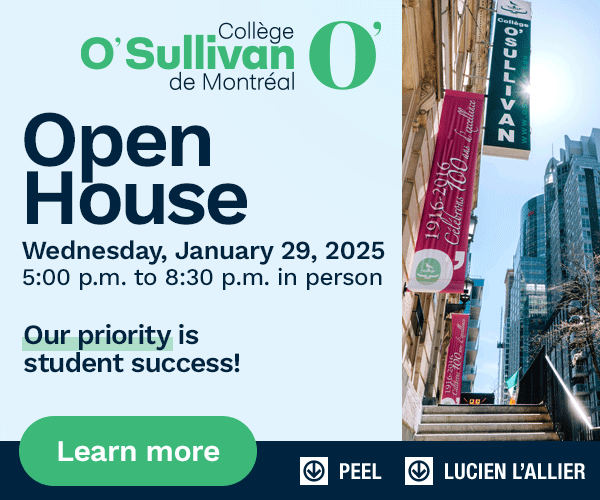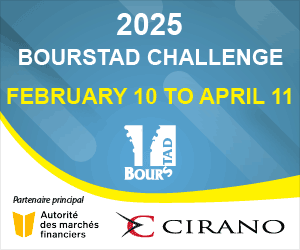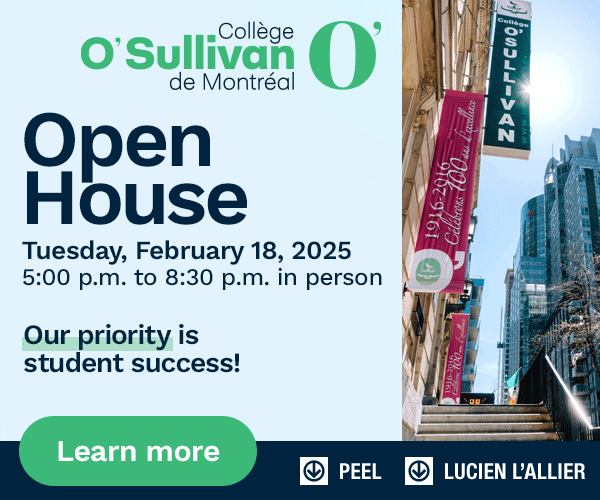Leanor Vlug dedicated 25 years to teaching the Deaf and Hard of Hearing community. Even after she retired from Vancouver Community College (VCC) in 2013, she continues to be an instrumental part of the college's community and its support for students with disabilities.
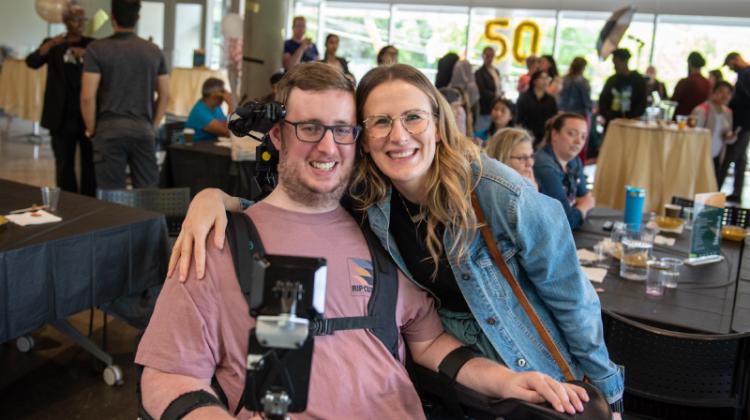
Deaf and Hard of Hearing faculty and VCC colleagues at the 50th celebration
"Many people, like Leanor, have been with us from the very beginning," says Marcia Tanaka, VCC's Department Leader for Deaf and Hard of Hearing. "It really speaks to the close bonds we have formed with each other and our commitment to improving access to education for the community."
Deaf since the age of 10, Vlug is a well-known figure in the Deaf community and has been widely recognized for her contributions. She is a recipient of the Queen's Diamond Jubilee Medal and received the Western Institute for the Deaf and Hard of Hearing Award of Merit and an excellence award from the Disability Resource Network.
This past May, VCC's four departments serving Deaf, Deaf-Blind, Hard of Hearing, and Visually Impaired adults came together to celebrate 50 years serving the community, providing education, and teaching job-readiness skills for adult learners with disabilities. Vlug was one of the guest speakers at the event and shared the history of the programs, which was also the topic of her research paper when completing her Master in Education (UBC).
"Since Mr. Wayne Bottlinger founded the Deaf and Hard of Hearing program [at VCC] 50 years ago, its personnel have tirelessly advocated for support through numerous changes in provincial education funding, new administrations, and evolving social trends," says Vlug. "The goal has always been to ensure the accessibility, communication, educational, and social needs of all students and staff."
The event, held at the college's Broadway campus featured guest speakers including VCC President and CEO, Ajay Patel, faculty, and past students who spoke about their experiences going through VCC programs. More than 100 faculty, staff, students, and community members attended the event.
"It was important for us to recognize the incredible contributions of our community and college members, past and present," says Tanaka, who was one of the event organizers.
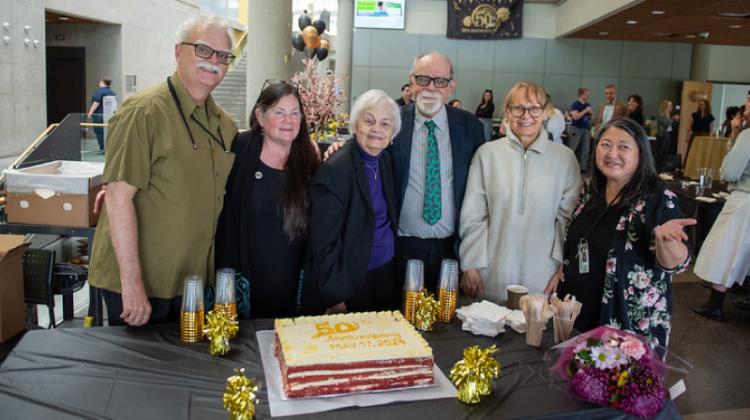
Vlug (centre left) and Tanaka (far right), celebrate 50 years of VCC Deaf and Visually Impaired programs, with students, faculty, staff, and community members at an event held at the college's Broadway campus on May 17, 2024.
In a pre-recorded message, Minister of Post-Secondary Education and Future Skills, Lisa Beare noted how in 2023, VCC acquired the only sign language interpretation diploma program in the province saying, "Sign language interpreters are vitally important to the Deaf and Hard of Hearing community and are essential for accessibility. I'd like to thank everyone gathered today for their passion and ongoing work in this area."
MLA Joan Phillip (Vancouver-Mount Pleasant), also attended and had this to share at the event: "Today, as we celebrate 50 years of programming in Deaf, Deaf-Blind, Hard of Hearing, and Visually Impaired adults, we reflect on the inclusive spirit that defines VCC a place where diversity is embraced, and everyone has the opportunity to thrive."
The Honourable Lisa Beare, Minister of Post-Secondary Education and Future Skills shares a message with the community in celebration of the college programs' 50th anniversary milestone
Recognizing the need for accessible education
50 years ago, it was exceedingly difficult for individuals with disabilities to find employment. Communication barriers, lack of opportunities for job training, and discrimination were just a few of the obstacles people with disabilities faced. John Walsh, a principal at Jericho Hill Provincial School for the Deaf recognized the need for his school's graduates to receive support not currently available.
He reached out to one of his teachers, Wayne Bottlinger to consider starting up a career preparatory class with a focus on job-readiness, English and math upgrading, and social skills in the workplace. The experimental class began in the fall of 1971 with nine students. Bottlinger, seeing the potential of the students, persuaded his contacts at Vancouver Vocational Institute VCC's precursor to accept the students and help them complete their job training.
By the time the institute was officially renamed Vancouver Community College in 1974, it would be the first post-secondary institution in the province to provide educational and employment access to students and staff with disabilities and Deaf, Deaf-Blind, and Hard of Hearing. Vlug became the first department leader for the college's Deaf and Hard of Hearing program (1992-2004).
"The community recognized the importance of this work long before the concept of "accessibility" had even surfaced," remarks Vlug.
The commitment and strong connection between college and students continued current and past students, former instructors, and support staff members stay in touch to work towards improving access for their communities.
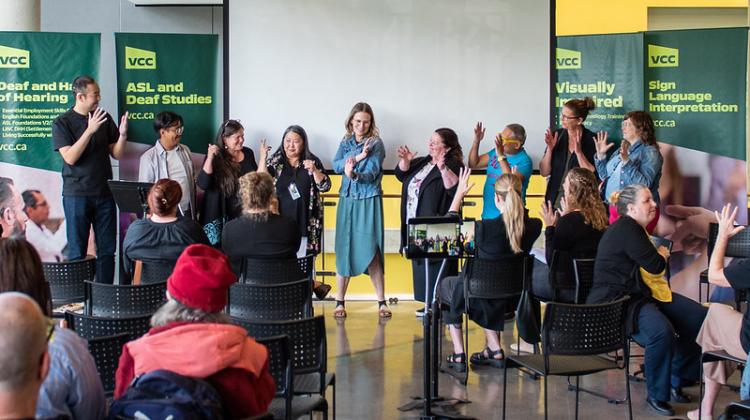
The Deaf and Deaf-Blind community work tirelessly to improve access and inclusion for all
Evolving to meet the needs of the community
Today, VCC's departments have grown and developed into internationally recognized programs, certificates, and courses.
The Deaf and Hard of Hearing program includes Essential Employment Skills Certificate, Living Successfully with Hearing Loss, American Sign Language (ASL), English Foundations, and Language Instruction for Newcomers to Canada (LINC) Deaf and Hard of Hearing.
The Visually Impaired Program offers Assistive Technology classes, literacy classes and Internet Foundation courses.
ASL and Deaf Studies has a long-standing ASL certificate program. The addition of the ASL interpretation diploma program and co-location of the two allow for a seamless integration of the two programs.
VCC is also one of the only colleges in the province to have full-time Registered Sign Language Interpreters on staff. Its Interpreting Services provides support to students, faculty, and staff to meet their accessibility needs.
"The test of time has shown how vital these developmental programs, courses, and services are to VCC and the broader community," enthuses Tanaka. "Most importantly, it demonstrates VCC's core values. We are a place that not only supports inclusive and diverse practices but celebrates it. I am so proud to be a part of that."








